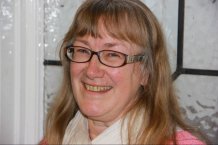
Professor Kate Newey.
Professor Kate Newey to give her inaugural lecture, 'The necessity of Theatre History: Making Visible the Invisible Women of the Theatre'
Professor Kate Newey’s inaugural lecture will explore the ties of family, work, and writing in the lives of the mostly unknown women of the Victorian theatre with a focus on Fanny Kemble and Constance Beerbohm.
Prof. Newey has spent a long time looking for and finding invisible women: women who wrote for and worked in the theatre during the nineteenth century. She comments, "although there always were women writing for the theatre, no-one looked for them very much – even Susannah Centlivre, the playwright second only to Shakespeare in popularity in the eighteenth century has been mostly forgotten".
Prof. Newey argues that looking for women’s work as artists is always a choice, but too often a choice that we don’t make – either deliberately or accidentally. To excavate forgotten, overlooked, and lost women is to engage directly and sometimes painfully with the conditions of the past. She attempts to understand that context for her subjects of study, no matter how contradictory and challenging it may turn out to be.
The lecture will look at two women who offer contrasting examples of the ways in which women playwrights were silenced through archival forgetting, and self-erasure: Fanny Kemble and Constance Beerbohm.
Fanny Kemble (1809-93) was an actress, diarist, letter-writer, playwright, translator and public reader of Shakespeare – a Victorian woman of letters. She lived a vivid life in the public eye , spectacularly divorcing her American husband as a reaction to the brutality of slavery and horror at slave-owning, an action which resulted in her losing residential access to her children. Kemble was also a prolific life-writer, producing four collections of life-writing: Records of a Girlhood, Records of a Later Life, Further Records, and Journal of a Residence on a Georgian Plantation in 1838–1839. For a woman who - deliberately or accidentally - had become a celebrity at eighteen, the focus of her epistolary autobiographies is her denial of and resistance to this public life. Yet, her life-writings demonstrate an unacknowledged conflict about her public life. The older writing Kemble deliberately silences her younger performing self, editing and forgetting her teenaged enthusiasms for saving her family’s fortunes, to create the anti-theatre self, who married a brash American plantation owner to escape the stage.
Constance Beerbohm was the sister of Herbert Beerbohm-Tree, and half-sister of Max Beerbohm. She took over her step-mother's role of running the Beerbohm household and liaison with the Beerbohm-Tree household, as well as the care of her much younger half-sister. She was an occasional and generally impoverished freelance journalist and occasional playwright, whose work is scattered throughout various ladies' magazines of the late nineteenth century. Like Kemble, she was part of a family dynasty which placed her at the centre of London artistic circles; in contrast to Kemble, public records of Beerbohm’s presence in this circle are scattered and few. However, there is an extensive, uncatalogued, largely unsorted cache of her letters in the Beerbohm-Tree archive at the Bristol Theatre Collection. These letters tell another story, overlooked by feminist literary historians for a variety of reasons: the archive is messy and reveals a highly-strung and difficult woman of self-abnegation and hysteria which is difficult to read.
Date: 5 January 2016
